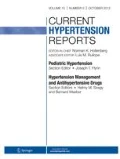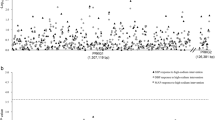Abstract
Purpose of Review
Excessive dietary salt intake is associated with an increased risk of hypertension. Salt sensitivity, i.e., an elevation in blood pressure in response to high dietary salt intake, has been associated with a high risk of cardiovascular disease and mortality. We investigated whether a causal association exists between dietary sodium intake and hypertension risk using Mendelian randomization (MR).
Recent Findings
We performed an MR study using data from a large genome-wide association study comprising 15,034 Korean adults in a community-based cohort study. A total of 1282 candidate single nucleotide polymorphisms associated with dietary sodium intake, such as rs2960306, rs4343, and rs1937671, were selected as instrumental variables. The inverse variance weighted method was used to assess the evidence for causality. Higher dietary sodium intake was associated with salt-sensitive hypertension risk. The variants of SLC8E1 rs2241543 and ADD1 rs16843589 were strongly associated with increased blood pressure. In the logistic regression model, after adjusting for age, gender, smoking, drinking, exercise, and body mass index, the GRK4 rs2960306TT genotype was inversely associated with hypertension risk (OR, 0.356; 95% CI, 0.236–0.476). However, the 2350GG genotype (ACE rs4343) exhibited a 2.11-fold increased hypertension risk (OR, 2.114; 95% CI, 2.004–2.224) relative to carriers of the 2350AA genotype, after adjusting for confounders. MR analysis revealed that the odds ratio for hypertension per 1 mg/day increment of dietary sodium intake was 2.24 in participants with the PRKG1 rs12414562 AA genotype.
Summary
Our findings suggest that dietary sodium intake may be causally associated with hypertension risk.





Similar content being viewed by others
Abbreviations
- MR:
-
Mendelian randomization approach
- SNP:
-
Single nucleotide polymorphism
- BMI:
-
Body mass index
- SBP:
-
Systolic blood pressure
- DBP:
-
Diastolic blood pressure
- LDL:
-
Low-density lipoprotein cholesterol
- HDL:
-
High-density lipoprotein cholesterol
- TG:
-
Triglycerides
- IVW:
-
Inverse-variance weighted method
- ACE:
-
Angiotensin-converting enzyme
- β2-AR:
-
β2-adrenergic receptor
References
Pilic L, Pedlar CR, Mavrommatis Y. Salt-sensitive hypertension: mechanisms and effects of dietary and other lifestyle factors. Nutr Rev. 2016;74:645–58.
Lewington S, Clarke R, Qizilbash N, Peto R, Collins R. Age-specific relevance of usual blood pressure to vascular mortality: a meta-analysis of individual data for one million adults in 61 prospective studies. Lancet. 2002;360:1903–13.
Chen J. Sodium sensitivity of blood pressure in Chinese populations. Curr Hypertens Rep. 2010;12:127–34.
Lawes CM, Vander Hoorn S, Rodgers A. Global burden of blood-pressure-related disease, 2001. Lancet. 2008;371:1513–8.
Rust P, Ekmekcioglu C. Impact of salt intake on the pathogenesis and treatment of hypertension. Adv Exp Med Biol. 2017;956:61–84.
Poulter NR, Khaw KT, Hopwood BE, Mugambi M, Peart WS, Rose G, et al. The Kenyan Luo migration study: observations on the initiation of a rise in blood pressure. BMJ. 1990;300:967–72.
Whelton PK, He J, Appel LJ, et al. Primary prevention of hypertension: clinical and public health advisory from the National High Blood Pressure Education Program. JAMA. 2002;288:1882–8.
Weinberger MH. Salt sensitivity of blood pressure in humans. Hypertension. 1996;27:481–90.
Morimoto A, Uzu T, Fujii T, Nishimura M, Kuroda S, Nakamura S, et al. Sodium sensitivity and cardiovascular events in patients with essential hypertension. Lancet. 1997;350:1734–7.
He J, Gu D, Chen J, Jaquish CE, Rao DC, Hixson JE, et al. Gender difference in blood pressure responses to dietary sodium intervention in the GenSalt study. J Hypertens. 2009;27:48–54.
Overlack A, Ruppert M, Kolloch R, Göbel B, Kraft K, Diehl J, et al. Divergent hemodynamic and hormonal responses to varying salt intake in normotensive subjects. Hypertension. 1993;22:331–8.
Richardson SI, Freedman BI, Ellison DH, Rodriguez CJ. Salt sensitivity: a review with a focus on non-Hispanic blacks and Hispanics. J Am Soc Hypertens. 2013;7:170–9.
Campese VM. Salt sensitivity in hypertension. Renal and cardiovascular implications. Hypertension. 1994;23:531–50.
Chekroud AM. A mendelian randomization approach for assessing the relationship between physical activity and depression. JAMA Psychiatry. 2019;76:361–2.
Takahashi H, Cornish AJ, Sud A, Law PJ, Disney-Hogg L, Calvocoressi L, et al. Mendelian randomization provides support for obesity as a risk factor for meningioma. Sci Rep. 2019;9:309.
Relton CL, Davey SG. Mendelian randomization: applications and limitations in epigenetic studies. Epigenomics. 2015;7:1239–43.
Burgess S, Butterworth A, Thompson SG. Mendelian randomization analysis with multiple genetic variants using summarized data. Genet Epidemiol. 2013;37:658–65.
Lee Y, Park HC, Shin JH, Lim YH, Shin J, Park JK. Single and persistent elevation of C-reactive protein levels and the risk of atrial fibrillation in a general population: the Ansan-Ansung Cohort of the Korean Genome and Epidemiology study. Int J Cardiol. 2018;277:240–6.
Kim J, Yoon DW, Lee SK, et al. Concurrent presence of inflammation and obstructive sleep apnea exacerbates the risk of metabolic syndrome: a KoGES 6-year follow-up study. Medicine (Baltimore). 2017;96:e4488.
Kim Y, Han BG. Cohort profile: the Korean genome and epidemiology study (KoGES) consortium. Int J Epidemiol. 2017;46:1350.
Kim B, Choi HY, Kim W, Ahn C, Lee J, Kim JG, et al. The cut-off values of surrogate measures for insulin resistance in the Korean population according to the Korean Genome and Epidemiology Study (KOGES). PLoS One. 2018;13:e0206994.
Choi JR, Ahn SV, Kim JY, Koh SB, Choi EH, Lee GY, et al. Comparison of various anthropometric indices for the identification of a predictor of incident hypertension: the ARIRANG study. J Hum Hypertens. 2018;32:294–300.
Choi JR, Kim JY, Huh JH, Kim SH, Koh SB. Contribution of obesity as an effect regulator to an association between serum leptin and incident metabolic syndrome. Clin Chim Acta. 2018;487:275–80.
Lee JH, Go TH, Lee SH, Kim J, Huh JH, Kim JY, et al. Association between serum urate and risk of hypertension in menopausal women with XDH gene. J Clin Med. 2019;8:738.
Bowden J, Davey Smith G, Haycock PC, Burgess S. Consistent estimation in mendelian randomization with some invalid instruments using a weighted median estimator. Genet Epidemiol. 2016;40:304–14.
Bowden J, Davey Smith G, Burgess S. Mendelian randomization with invalid instruments: effect estimation and bias detection through Egger regression. Int J Epidemiol. 2015;44:512–25.
Hartwig FP, Davey Smith G, Bowden J. Robust inference in summary data Mendelian randomization via the zero modal pleiotropy assumption. Int J Epidemiol. 2017;46:1985–98.
Hemani G, Zheng J, Elsworth B, Wade KH, Haberland V, Baird D, et al. The MR-base platform supports systematic causal inference across the human phenome. eLife. 2018;7:e34408.
Tiffin N, Meintjes A, Ramesar R, Bajic VB, Rayner B. Computational analysis of candidate disease genes and variants for salt-sensitive hypertension in indigenous southern Africans. PLoS One. 2010;5:e12989.
Svetkey LP, Chen YT, McKeown SP, Preis L, Wilson AF. Preliminary evidence of linkage of salt sensitivity in black Americans at the beta 2-adrenergic receptor locus. Hypertension. 1997;29:918–22.
Williams JS, Chamarthi B, Goodarzi MO, Pojoga LH, Sun B, Garza AE, et al. Lysine-specific demethylase 1: an epigenetic regulator of salt-sensitive hypertension. Am J Hypertens. 2012;25:812–7.
Frisoli TM, Schmieder RE, Grodzicki T, Messerli FH. Salt and hypertension: is salt dietary reduction worth the effort? Am J Med. 2012;125:433–9.
Bhatnagar V, O'Connor DT, Brophy VH, Schork NJ, Richard E, Salem RM, et al. G-protein-coupled receptor kinase 4 polymorphisms and blood pressure response to metoprolol among African Americans: sex-specificity and interactions. Am J Hypertens. 2009;22:332–8.
Vandell AG, Lobmeyer MT, Gawronski BE, Langaee TY, Gong Y, Gums JG, et al. G protein receptor kinase 4 polymorphisms: beta-blocker pharmacogenetics and treatment-related outcomes in hypertension. Hypertension. 2012;60:957–64.
Liu C, Xi B. Pooled analyses of the associations of polymorphisms in the GRK4 and EMILIN1 genes with hypertension risk. Int J Med Sci. 2012;9:274–9.
Zhang H, Sun ZQ, Liu SS, Yang LN. Association between GRK4 and DRD1 gene polymorphisms and hypertension: a meta-analysis. Clin Interv Aging. 2016;11:17–27.
Lee MR, Lim YH, Hong YC. Causal association of body mass index with hypertension using a Mendelian randomization design. Medicine (Baltimore). 2018;97:e11252.
Zhao PP, Xu LW, Sun T, Wu YY, Zhu XW, Zhang B, et al. Relationship between alcohol use, blood pressure and hypertension: an association study and a Mendelian randomisation study. J Epidemiol Community Health. 2019;73:796–801.
Funding
This study was supported, in part, by a grant from the Korea Center for Disease Control and Prevention (2005-E71013-00, 2006-E71002-00, 2007-E71013-00, 2008-E71004-00, 2009-E71006-00, 2010-E71003-00). This research was supported by the Basic Science Research Program through the National Research Foundation of Korea (NRF), funded by the Ministry of Education (2017R1D1A3B03034119, 2014M3C9A3064552), and the KRIBB Initiative program. This research was also supported by the Medical Research Center Program (2017R1A5A2015369). Furthermore, this work was supported (in part) by the Yonsei University Research Fund 2017. Bioresources for this study were provided by the National Biobank of Korea and the Centers for Disease Control and Prevention, Republic of Korea (2017-009).
Author information
Authors and Affiliations
Contributions
The authors’ responsibilities were as follows—SBK and JRC acquired the data and designed and conducted the research; SJ and JRC analyzed the data and drafted the manuscript; SJ, NK, and JRC analyzed the data and had primary responsibility for final content; J-Y K and YC critically revised the manuscript for important intellectual content; and all authors read and approved the final manuscript. The other authors report no conflicts of interest.
Corresponding authors
Ethics declarations
Conflict of Interest
The authors declare that they have no conflict of interest.
Additional information
Publisher’s Note
Springer Nature remains neutral with regard to jurisdictional claims in published maps and institutional affiliations.
This article is part of the Topical Collection on Nutrition and Hypertension
Rights and permissions
About this article
Cite this article
Jeong, S., Kim, JY., Cho, Y. et al. Genetically, Dietary Sodium Intake Is Causally Associated with Salt-Sensitive Hypertension Risk in a Community-Based Cohort Study: a Mendelian Randomization Approach. Curr Hypertens Rep 22, 45 (2020). https://doi.org/10.1007/s11906-020-01050-4
Published:
DOI: https://doi.org/10.1007/s11906-020-01050-4




